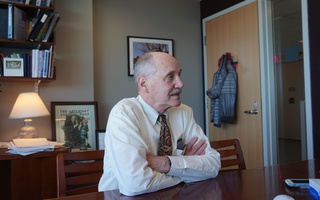{shortcode-63d67f65a37f351aca5b90be060b2cdb5615e44f}
More than half of Harvard Law School students who responded to a 2017 mental health survey reported experiencing mild to severe depression and anxiety, according to a report released Friday by a Law School working group of faculty, staff, and students.
The report references aspects of a 2017 student mental health survey at the Law School, whose results student activists have long called on administrators to publish. The working group’s report is accessible to affiliates of the school online.
HLS assembled the working group in fall 2018, tapping Marcia L. Sells, the Law School’s dean of students, and Jessica L. Soban ’02, the school’s associate dean for strategic initiatives, to lead it.
“The Working Group met multiple times over the past year, examining data, consulting with members of the Law School and University communities, speaking with experts, and thinking creatively about how to promote student well-being,” Law School Dean John F. Manning ’82 wrote in an email to students Friday.
The group reported that 35 percent of Law School respondents to the survey screened positive for mild depression, 15.6 percent for moderate depression, 5.8 percent for moderately severe depression, and 3.6 percent for severe depression. The survey also found 15.1 percent of Law School respondents screened positive for moderate anxiety and 9.1 percent screened positive for severe anxiety.
Administered anonymously, the Law School conducted the survey in coordination with the school’s student government and then-Executive Director of Harvard University Health Services Paul J. Barreira between November 16, 2017 and January 19, 2018.
Roughly 44 percent of law school students across cohorts responded to the survey. Participation rates varied by class year and program: 44.1 percent of first-year Law School students took the survey, compared to 49.3 percent of second-year students, 42.2 percent of third-year students, and 33.9 percent of Doctor of Juridical Science students.
Manning wrote in his email to students that the report provides a sense of where the Law School stands in the broader context of the legal profession, legal education, and graduate education.
“Through a series of thoughtful recommendations, the Working Group also lays out an initial framework for addressing the mental health and well-being challenges on our campus,” Manning wrote. “They further identify some things we can do right away to improve student well-being.”
The survey also asked three questions related to suicide, including a question asking whether respondents had considered committing suicide at any time during their life.
Barreira — who currently directs graduate student mental health initiatives — wrote in a letter to the working group that he now believes the data from those questions is flawed and does not accurately measure current risk. The report does not include any of the data from the suicide-related questions.
“In the initial administration of the mental health graduate student survey in 2016 and 2017, I used the Suicidal Behaviors Questionnaire-Revised to assess level of suicidality,” Barreira wrote. “After the administration of two surveys, however, I realized that I was unintentionally measuring primarily life-time risk of suicidality, rather than current risk.”
Addressing sleep, exercise, and alcohol use, the working group’s report found that respondents were not practicing “adequate” self-care.
Just over 40 percent of respondents reported that “they do not feel rested when they wake up for the majority of days in a week,” and 80.9 percent reported that they do not meet the American Heart Association guidelines for exercise. 37.5 percent screened positive for problematic drinking.
The report stated that environmental factors — including the “imposter phenomenon,” social support and loneliness, and feeling overwhelmed — may factor into the survey’s results and could provide potential “areas for intervention.” It also noted that only 55.1 percent of respondents were aware of available campus mental health resources, while 19.5 percent reported concerns that seeking mental health help might impact their bar eligibility.
The working group also compiled a list of recommendations to “support well-being and mental health at both HLS and the University.” The recommendations included expanding avenues to workshops and clinical care, fostering a cohesive Harvard Law School community to support students' well-being, advocating to eliminate mental health questions from bar applications, and more effectively communicating available resources and services.
“Although we can never eliminate stress or worry entirely, we can aspire to reduce the stigma associated with mental health challenges, to help students better care for themselves and their peers, and to provide the robust continuum of wellness and mental health resources that students need to thrive at HLS,” the report reads.
Since 2016, Harvard University Health Services has conducted multiple graduate and professional school mental health surveys. The Law School’s report references data collected in those surveys to contextualize its own statistics.
In a November interview, Barierra said mental health surveys of College freshmen and five departments across the Graduate School of Arts and Sciences showed significant signs of depression and anxiety. Prevalence rates of depression across the surveyed graduate departments ranged from 15 percent to 30 percent, while prevalence rates of anxiety ranged from a 13.2 percent to 30 percent. The surveys had an average response rate of 63.5 percent.
“There's a small percentage of students across the University, just graduate students, who we would want every one of them to be in treatment or at least getting an evaluation,” Barreira said in November.
Since 2018, the Law School has created programming that promotes self-care, including new clinical drop-in hours at Pound Hall, expanded grief support groups, and more mental health training for student advisors, according to the report.
In 2019, HUHS piloted same day appointments at Counseling and Mental Health Services, which are single 30-minute counseling sessions to discuss non-urgent issues. The appointments are for students not already seeing a clinician. CAMHS and the Undergraduate Council also launched an anonymous and confidential online screening tool for depression, eating disorders, alcohol use, anxiety, and Post Traumatic Stress Disorder earlier this year.
The working group concluded that the Law School can do more to support students.
“Despite the efforts undertaken by HLS in the relatively short period since the 2017-2018 survey, it is clear that more can and should be done to support student well-being and mental health at both HLS and the University,” the report reads. “Both have taken up the challenge in parallel.”
— Staff Writer Michelle G. Kurilla can be reached at michelle.kurilla@thecrimson.com. Follow her on Twitter @MichelleKurilla
Read more in University News
Vicki Rosen Named Interim Dean of Harvard School of Dental Medicine















